This project is made possible through the partnership of WATER CHARITY and the NATIONAL PEACE CORPS ASSOCIATION. ![]()
This project has been completed. To read about the conclusion, scroll down below.
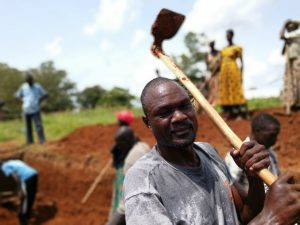 Location
Location
Awach Village, Gulu, Uganda
Community Description
Awach Village is about 40 KM from Gulu. Despite a decade of conflict between government forces and the Lord’s Resistance Army, the people of Awach are warm and open. The village is predominately made up of the Acholi tribe. The residents rely largely on agriculture for their source of income. Those who do not own land are forced to tend to other people’s land or engage in sand mining for a small salary.
Regardless of tribe, religion, and income source, every parent that spoke with our partner organization shared the same goal of providing a better future for their children. The key to this future is education. However, there are a number of barriers that prevent their children from obtaining a quality education. Students are learning in a building that was built in 1954, almost a decade before Uganda gained independence. There are large holes in the wall and the floor is essentially just gravel after decades of wear and tear, but the more pressing problem is the lack of accessible latrines.
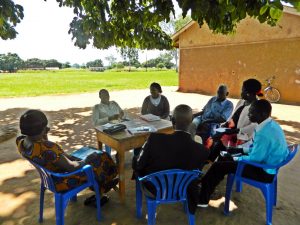 Currently, there are over 70 disabled students enrolled at Awach Central Primary School, but the latrines were not designed to accommodate their needs. The latrine itself was built by an NGO over a decade ago. Cracks run along the walls. The school has a bore well, but no handwashing station or soap.
Currently, there are over 70 disabled students enrolled at Awach Central Primary School, but the latrines were not designed to accommodate their needs. The latrine itself was built by an NGO over a decade ago. Cracks run along the walls. The school has a bore well, but no handwashing station or soap.
Problem Addressed
A major obstacle to obtaining an education in Uganda is the lack of accessible latrines. Currently, Awach has one latrine that serves the entire school’s population of 991 students. There are no handrails, ramps, or other supports for disabled students.
Furthermore, the condition of the latrine is dangerously unsanitary. There is less than six inches from the waist to the top of the latrine. The smell almost unbearable and any student brave enough to enter the latrine is instantly assaulted by a mass of flies. These flies spread diseases like typhoid and cholera. This lack of access to clean latrines disproportionally affects two populations, students with disabilities and female students.
Students with physical disabilities have difficulty squatting and may topple over into filth. Many of these students have weakened immune systems which increases their risk of contracting diseases. Currently, many students with disabilities prefer to walk home to use the restroom resulting in less time spent studying. Students with hearing or vision impairment risk serious injury when they venture into the bush to relieve themselves.
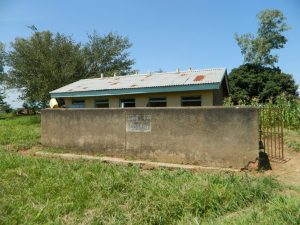 Girls in Uganda are reported to miss up to 24 days of the school year due to menstruation because of inadequate toilet facilities. The girls at Awach currently share the one latrine with boys. This creates an awkward situation for many girls who are embarrassed to use the restroom when boys are around. A female-only latrine will allow for greater retention of female students and ensure these students are able to focus on their education.
Girls in Uganda are reported to miss up to 24 days of the school year due to menstruation because of inadequate toilet facilities. The girls at Awach currently share the one latrine with boys. This creates an awkward situation for many girls who are embarrassed to use the restroom when boys are around. A female-only latrine will allow for greater retention of female students and ensure these students are able to focus on their education.
Faced with stigmatization, bullying, and health issues, many students simply decide education is outside their reach and drop-out. This crisis poses a serious threat to the education of an entire generation, but there is hope!
Project Description
This project is to build a new latrine and rehabilitate the existing latrine at the school.
The main goals of this project are to increase the enrollment of students with disabilities and female students as well as increase retention rates of all students. Other goals include educating students on the importance of washing their hands to prevent disease and reducing stigmatization of students with disabilities.
All construction and renovation will be done by AKA Construction. The foreman and laborer were given a house and food by the community as a further sign of their commitment to the project. Gulu Disabled Persons Union will progress inspections twice a week during the construction to ensure quality and pace.
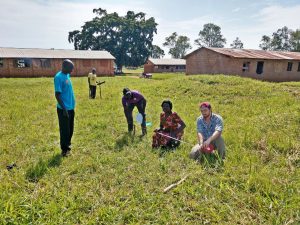 1. To create community buy-in, the parents have already dug the new latrine pit, in addition to feeding and housing the contractors. On July 22nd, 2018 roughly 80 parents came to dig the latrine pit and were able the dig the 7m X 3m x 3m pit in just one day! The value of this contribution is roughly 15% of the total project cost.
1. To create community buy-in, the parents have already dug the new latrine pit, in addition to feeding and housing the contractors. On July 22nd, 2018 roughly 80 parents came to dig the latrine pit and were able the dig the 7m X 3m x 3m pit in just one day! The value of this contribution is roughly 15% of the total project cost.
2. Construction of a new boy’s latrine, including one handicap-accessible stall, three standard stalls and a urinal that will drain into a soft pit to extend the longevity of the latrine. The handicap stall will feature handrails and a ramp so students with physical disabilities can easily use the facility.
The latrine will be drainable so that it can be used for an estimated twenty years or more. It will feature a hand washing station that will be feed with rainwater via a gutter system. The water tank can also be filled from the school’s borehole well during the dry season.
The Gulu District Government has approved the plans and certified that they meet Ugandan National Standards.
3. Drain and renovate the existing latrine. This latrine will have 9 stalls total, with one exclusively for handicapped students. This will serve as a girl’s latrine, offering more stalls and privacy. Since this latrine is larger than the newer one and there are more female students at Awach, this seems an ideal solution to the problems listed in the previous section.
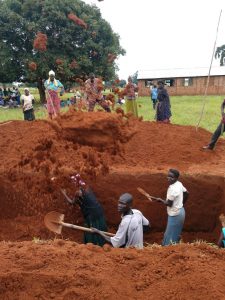 The renovations include:
The renovations include:
a. Draining and disinfecting the current latrine pit.
b. Retrofitting one stall with handrails
c. Addressing any structural issues in the pit and the superstructure.
d. Constructing a ramp for female students with physical disabilities/wheelchairs
e. Installing steel doors to replace the termite-eaten wooden doors
f. Repainting the entire structure.
4. WASH training will be given to the teachers so they can educate their students on the importance of handwashing. The training will be conducted by the Gulu Disabled Persons Union which has conducted similar training for other schools in the area. A pre-and post-project survey will be conducted to ensure the information being presented is retained.
5. Inclusiveness training will also be conducted by the Gulu Disabled Person Union to help address the stigmatization surrounding students with disabilities. This will not only address students’ behaviors, but the way teachers interact with students with hearing, vision, physical, and mental impairments.
6. Government involvement is the key to sustained impact. The local and regional government has agreed to this project design. In order to solve other problems facing Awach, government officials will be invited to the school to inspect the classrooms with the hope of forming an agreement to earmark government funds for further improvements.
7. Monitoring and evaluation are critical to sustainability. Gulu Disabled Persons Union takes this portion of the project very seriously.
Project Impact
991 students will benefit from the project, including 499 girls, 492 male, 75 total students with a disability.
Project Administration
Christopher Markomanolakis, Returned Peace Corps Volunteer, Tanzania (’14 – ’17)
Monitoring and Maintenance
Gulu Disabled Persons Union’s mission is to advocate for increased participation and recognition of persons with disabilities. The organization is dedicated to creating an inclusive environment for anyone with a disability which is why monitoring is thoroughly conducted on all its projects. All parties involved (Gulu Disabled Persons Union, Awach Central Primary School, Awach PTA) have signed a contract agreeing to the project terms for detailed monitoring and evaluation.
All monitoring will be conducted by Gulu Disabled Persons Union in partnership with the school. The following indicators will be monitored to conduct a valid evaluation of the latrine toward the ultimate outcome of increased enrollment of students with disabilities and girls.
1. Enrollment data collection- Every term (Biannually)
2. Attendance data collection – Monthly
3. Inspection of toilets maintenance –Monthly
4. Pre and post surveys to measure retention of training information – Before & three months after
5. Collecting stories to gain qualitative data – Annually
Let Girls Learn
With these latrines, girls will have the privacy necessary to feel secure when at school. The separation of gender will allow greater freedom to these girls. This makes it more likely that girls will be able to go to and remain in school.
Project Funding
This project has been funded by an anonymous donor. We encourage additional donations, which will be used for our next project in Uganda.
Conclusion of Awach Latrine Project – Uganda
This project has been completed under the direction of Returned Peace Corps Volunteer Christopher Markomanolakis. To read about the start of the project, CLICK HERE.
The project was designed to build a new latrine and rehabilitate the existing latrine at the school.
Christopher reports:
It gives me enormous pleasure to inform you that the Awach Latrine Project is complete! The success of this project would not have been possible without Water Charity’s support and I am very thankful for the opportunity to work with your organization. Please find the information detailing this project below:
Scope of Work:
Gulu Disabled Persons Union (GDPU) sought to increase enrollment amongst children with disabilities at Awach Central Primary School by constructing sustainable, handicap accessible latrines. The construction is paired with a training on inclusion and WASH practices, facilitated by GDPU staff. This training covered three topics: advocacy for students with disabilities, practical steps to create an inclusive school, and the importance of proper hygiene.In June, Awach had 911 student, but only one latrine. Girls and boys of all ages were forced to use the same facilities. The latrine itself was on the verge of overflowing. It was infested with flies and threatened the health and safety of students. With the generous support of Water Charity, GDPU was able to completely construct a new latrine while draining and renovating the existing latrine.
Each latrine included a rain gutters that fed into a 250-liter tank with a spout and will serve as the handwashing station. An initial supply of hand soap and toilet paper were secured through the generosity of local government leaders and parents of students.
Project Timeline:
Winter 2017: The project began with GDPU, in partnership with local government, conducting a needs assessment to identify the ideal school for the project. Awach Central Primary School was selected due to its size and large proportion of students with disabled (50 in total).June 6th: GDPU staff met with school officials to go over the project’s scope to ensure initial buy-in from the teachers and staff. The meeting was brief as the school officials were more than happy to partner on this project.
June 20th: The first step of the construction process began with a meeting with PTA members, local government officals, and over 120 parents to explain the project and gauge interest. The parents were ecstatic and agreed to dig the new latrine pit to serve as the community contribution.
June 21st: Over 250 parents worked tirelessly to dig a 9-meter-deep pit. The parents organized themselves into shifts which helped expediate the digging.
June 22nd: Once the pit was ready, the contractors began their work. One team of contractors built the new latrine that met government construction standards. Simultaneously, another team drained the existing latrine before renovating the superstructure. The two latrines were completed in less than 10 weeks. The work went smoothly with can be attributed to the constant oversight of GDPU, teachers, and parents.
July: GDPU did at least two monitoring visits to the construction site per week. During this time, GDPU facilitated an inclusion/WASH training in which over twenty teachers attended. A pre/posttest consisting of the same 13 questions were administered to the participants. The pre-test average was 65% while the posttest average jumped to 91%, a significant increase in understanding of disabled rights and WASH.
August 18th: The latrines were completed, painted, and ready for use on August 13th, 2018.
August 14th: To celebrate the success of the project and thank the community for their involvement, a hand-over ceremony was held on with over 300 people in attendance. The event was filled with music, dancing, and speeches while the children got to enjoy games and face painting.
Impact:
One major impact of this project is the construction of one latrine and the renovation of another, resulting in two handicap accessible latrines that are long-lasting and hygienic. Awach teachers have created a cleaning schedule to ensure that latrines are well maintained. Each class will alternate cleaning responsibilities ever week which will give students a sense of ownership and reduce the potential for vandalism.Another impact is the increased understanding of disability rights by teachers at Awach and the larger community. The handover ceremony focused on the rights and struggles of disabled students, allowing parents and other attendees a chance to hear about a topic often overlooked in rural Uganda.
Longer term impact will be measured through enrollment and attended records kept by the school. In addition, a student survey was conducted with over 120 students to gain a baseline for future study. The 31-question survey focused on a range on indicators including current WASH practices, attitudes towards disabled students, students’ self-esteem, and the condition of the school. GDPU will gather the post-intervention surveys after four months.
Quotes:
– Awach was the school for all children of those displaced by the war. Look, you can see all the old collapsed latrines scattered around the grounds, but because of GDPU this school with have a future”
– “I am amazed by the community involvement in this project. We at the district have committed funds to build two new classrooms this financial year with two more in the following financial year. How can a school have beautiful latrines and crumbling classrooms?”
“GDPU has always been a blessing to our community. {The district government] has always had an amazing partnership with GDPU that I hope will grow in the coming years.”
The District Education Officer of Gulu, Uganda“I am coming tomorrow at sunrise to help you dig the latrine for our children”
Aderyo Rosalba – Grandmother of Awach – 82 years oldPictures and Videos: The following link is a Flickr account managed by AP and has over 100 photos taken throughout the project. https://flic.kr/s/aHsmkNtJch
Thank you again for this amazing partnership opportunity.
We extend our thanks to Christopher for completing this important project.